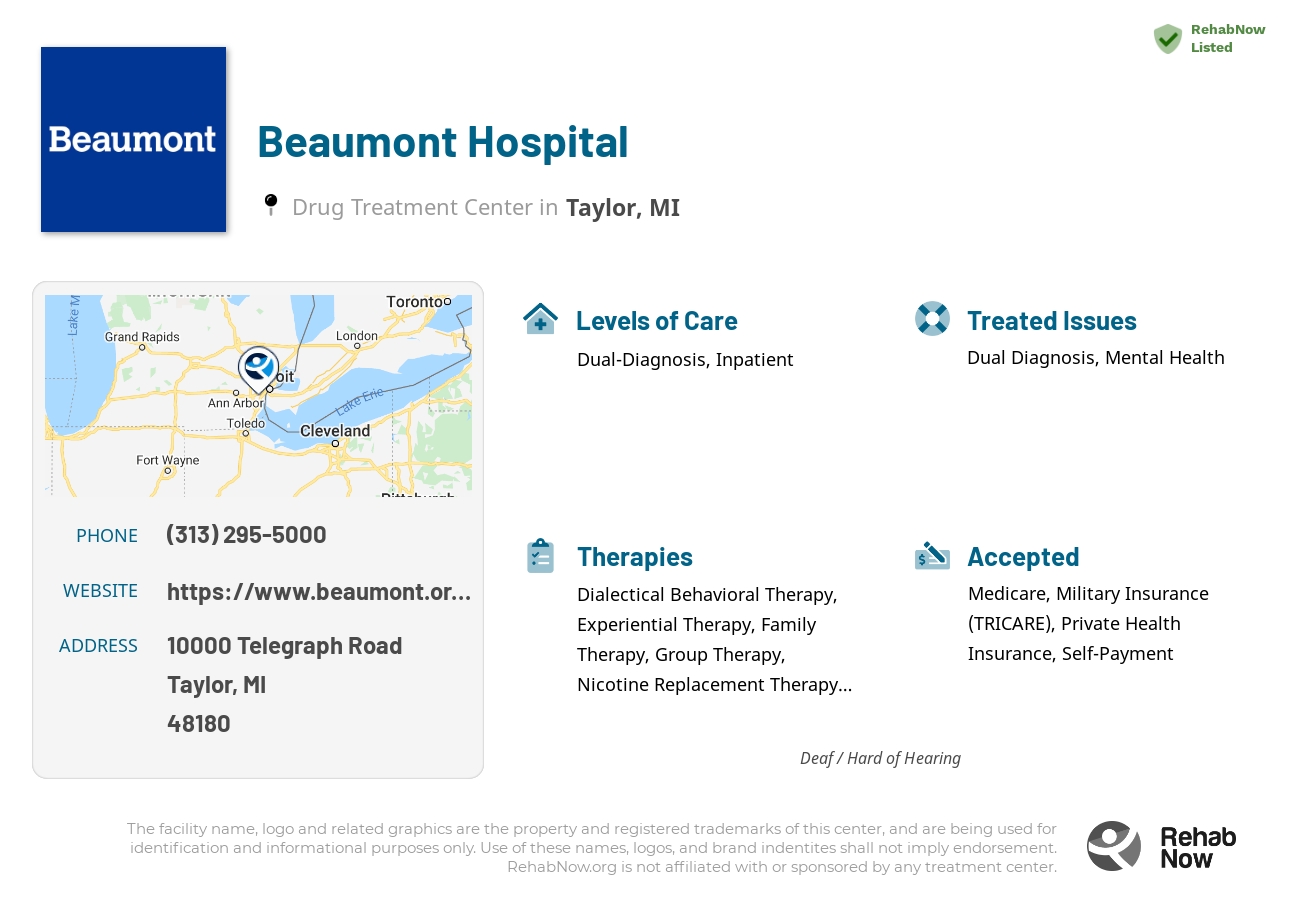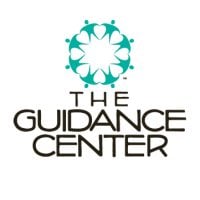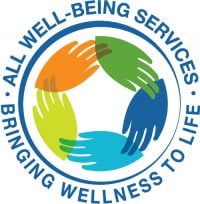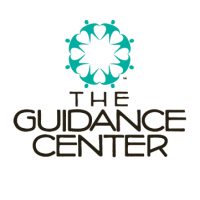Beaumont Hospital
Drug Rehab Center in Taylor, Michigan
Beaumont Hospital in Taylor, Michigan provides full-service acute care and specialty care services including addiction and substance abuse services, with comprehensive programs and interventions to address the underlying psychological and behavioral problems associated with addiction.
About
Beaumont Hospital, founded in 1965, is an Addiction Treatment Facility located in Taylor, Michigan. This facility specializes in helping individuals who are suffering from Dual Diagnosis and Mental Health disorders. Beaumont Hospital offers Dual-Diagnosis treatment, which addresses both the addiction and the underlying mental health issues that may be contributing to the substance abuse problem. They also provide Inpatient levels of care, allowing individuals to receive comprehensive treatment within a supportive and structured environment. Additionally, Beaumont Hospital accepts Private Health Insurance which can help alleviate some of the financial burden associated with seeking addiction treatment.
At Beaumont Hospital in Taylor, Michigan, various effective services and treatments are available for addiction and substance abuse. Their focus is on Dual-Diagnosis treatment, recognizing that addressing both mental health concerns and addiction is crucial for successful recovery. This integrative approach allows individuals to receive tailor-made care that meets their specific needs. As an inpatient facility, Beaumont Hospital provides a supportive and structured environment where individuals can undergo comprehensive treatment programs including therapy, counseling sessions, group sessions, medication management (if required), and other evidence-based techniques aimed at promoting long-term recovery. The acceptance of Private Health Insurance further helps remove potential barriers to accessing quality addiction treatment services at Beaumont Hospital.
Genders
Ages
Modality
Additional
Conditions and Issues Treated
A person who struggles with addiction and a mental health condition suffers from a dual diagnosis. This means that they have two issues that must be treated. The specific mental health issues that the patient at Beaumont Hospital might have include but are not limited to:
- Depression
- Bipolar Disorder
- Anxiety
- PTSD (Post Traumatic Stress Disorder)
The specific addiction issues that the patient might have include but are not limited to:
- Alcoholism
- Drug Addiction (i.e., Cocaine, Meth, and other stimulants, Marijuana, and Ecstasy)
The combination of the two illnesses can be tough to treat. Taking care of one or the other is tough, and taking care of both cannot be done alone. A patient who receives dual diagnosis treatment will be given the best chance at becoming sober.
Levels of Care Offered
This center offers a variety of custom treatment tailored to individual recovery. Currently available are Dual-Diagnosis, Inpatient, with additional therapies available as listed below.
Inpatient treatment centers offer a safe, secure, and often medically supervised environment for drug or alcohol-addicted individuals. Many of these facilities are equipped to provide detoxification, treatment for co-occurring mental health disorders, and aftercare programs.
The patient typically spends 28 to 30 days at the facility and will receive extensive drug counseling. They will also learn how to live without drugs and how to make the right decisions in life.
Therapies & Programs
The therapies typically involve all family members, potentially including siblings, children, and parents who play a role in their daily lives. These sessions can be essential because they address past issues that may have affected an addict or alcoholic’s recovery process. They provide support during this time when it is needed most!
A family therapy session, often called a family meeting or intervention, is a necessary process that helps loved ones of addicts see their situation in a new light. It’s also one of the most challenging things families will ever have to do when they’re facing a loved one battling addiction or alcoholism.
Group therapy sessions provide recovering addicts with a chance to cope with everyday situations that many face. Group therapy sessions are held in rehab facilities, clinics, churches or community centers that offer drug addiction treatment.
People who attend these groups are encouraged to voice their feelings and support other addicts in recovery. This helps group members strengthen their own recovery program while cheering on others who are struggling with sobriety.
Trauma therapy allows them to work through past trauma to have peace of mind and begin down the road of sobriety. The therapist will work with the individual to help them understand their past and present relationships. Patients may often believe that something is inherently wrong with them or they are unworthy of love. The therapist aims to correct these negative feelings and behaviors by helping the person realize that their actions do not reflect who they truly are.
Dialectical behavior therapy, or DBT, is one form of cognitive behavioral treatment. This type of therapy typically involves both individual and group sessions with a therapist on a regular basis.
It uses concepts like mindfulness training to help addicts learn how to identify their thoughts, feelings, behaviors and the experiences that trigger them so they can avoid relapse. DBT also teaches addicts how to regulate their emotions, which can make it easier for them to avoid or overcome negative thoughts and cravings.
Cognitive Behavioral Therapy (CBT) is a highly effective treatment option based on the idea that how we feel, think and act all interact together. Our thoughts determine our feelings and behaviors; our feelings affect our thoughts, and our behaviors change our thoughts and feelings. CBT helps people explore their thoughts for problems (or false beliefs) that influence their mood and actions. By examining their thoughts and beliefs, people can recognize distorted or irrational and modify them to more realistic, positive ones. CBT is very goal-oriented, which means that the therapist and patient work together on a specific problem while learning to become more adept at solving future problems.
CBT works well with a broad range of people, including those with depression, anxiety disorders, eating disorders, and problems with anger. In addition to helping a client focus on thoughts that can be changed, CBT also allows them to take an active role in their treatment. This is called a collaborative approach because both patient and therapist work together to produce the best possible results.
CBT is based on cognitive learning theory, which says that our behavior is a learned response to our environment. Cognitive refers to thoughts and beliefs, while behavioral relates to actions or deeds. CBT helps people learn ways of behaving to improve their quality of life by focusing on specific problems or goals they want to achieve. Sometimes, CBT is used alone; other times, it is combined with medications or brief counseling techniques such as solution-focused and motivational interviewing to achieve optimal results for the patient.
Patient Experience
Experiential Therapy at Beaumont Hospital
Drug addicts can benefit from experiential therapy, which involves real-time activities to process trauma and emotions. This type of therapy is available at Beaumont Hospital and can help reduce the need to resort to drugs and alcohol. Activities may include role-playing, use of props, and others. The individual learns to release suppressed thoughts that lead to negative feelings and embrace the present moment. Experiential therapy is beneficial in treating various disorders, including drug addiction, eating, and behavioral disorders.
Payment Options Accepted
For specific insurance or payment methods please contact us.
Is your insurance accepted?
Ask an expert, call (888) 674-0062
Additional Details
Specifics, location, and helpful extra information.
Taylor, Michigan 48180 Phone Number(313) 295-5000 Meta DetailsUpdated November 25, 2023
Staff Verified
Patient Reviews
There are no reviews yet. Be the first one to write one.
Taylor, Michigan Addiction Information
Michigan has the second-highest rate of drug and alcohol abuse in the nation. Heroin is linked to more than 50% of the state's hepatitis C cases. Marijuana is the drug most often associated with crimes in Michigan, followed by methamphetamines. Opioids alone are responsible for almost 20% of all drug overdose deaths in Michigan.
Alcohol is a large contributor to drug-related problems in Taylor, Michigan. The number of people who died due to drug overdose has increased by more than 50% since 2000. Some of the prevalent addictions in Taylor are heroin, methamphetamine, MDMA, marijuana, cocaine, and methadone. Most people have started drugs by the age of 14. There are 12-step programs available in Taylor that offer support to people who are trying to stay drug-free.
Treatment in Nearby Cities
- Gaylord, MI (205.4 mi.)
- Benzonia, MI (217.6 mi.)
- Grand Blanc, MI (51.2 mi.)
- Mio, MI (172.6 mi.)
- Capac, MI (56.5 mi.)
Centers near Beaumont Hospital
The facility name, logo and brand are the property and registered trademarks of Beaumont Hospital, and are being used for identification and informational purposes only. Use of these names, logos and brands shall not imply endorsement. RehabNow.org is not affiliated with or sponsored by Beaumont Hospital.










